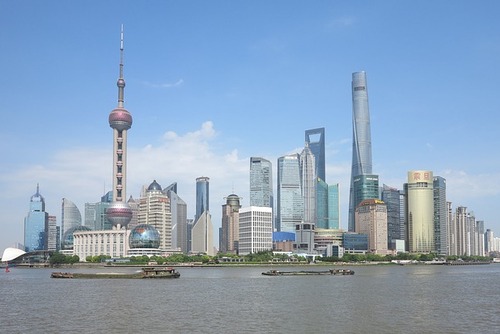There are more and more job opportunities becoming accessible to internationals and English speakers and salaries can be very high depending on the employer and industry.
But what are the potential risks and issues you are likely to face when moving to China? Check out our list of things you should consider before applying to work in China.
1. How to Get a Job
You can find jobs in most industries from banking and finance, to media, IT, business, finance and education. Both local and international companies hire foreign staff all year round.
Going to teach English in China is a really popular option to consider especially if you are a graduate looking to work abroad. Salaries are high and there are usually lots of added benefits including accommodation, meals and sometimes flights.
You can find jobs advertised online and you will usually need to go through a standard application process and secure an interview online. For jobs advertised internationally interviews and positions will usually be in English, although knowing basic Mandarin/Cantonese will be a huge benefit to get getting hired.
2. Visa & Work Permit
Obtaining a Chinese work permit can seem complicated, but the process is easier than you might think.
The application process works like this:
- Search jobs in China online and get hired
- Gather all the necessary documents
- Apply for a China work visa
- Complete the fee payment
- Wait for your visa
- Buy flights and make travel arrangements to China
- Register with the local police
If you are being hired to work in China from overseas, most companies will help you with the process and also arrange the correct paperwork.
Please research all placements thoroughly before departing and make sure you have the right visa to avoid any issues once in the country.
There have been instances of agencies and some recruiters not being reputable and some foreign interns and teachers have been prosecuted for working in China on incorrect visas.
3. Decide Where to Live

First, you must realise the enormity of China and some provinces will be easier to live than others.
In cities like Shanghai, Beijing and Hong Kong there are huge international communities and not speaking the local language shouldn't be a problem. Rural areas can be difficult to adapt to where there are few Westerners.
Most jobs for foreigners are in the larger cities like Beijing, Shanghai and Shenzhen but where you go really depends on the job offer.
These cities have the highest costs of living: Hong Kong, Shanghai, Guangzhou, Beijing and Shenzhen. Cheaper cities include Nanjing, Chengdu, X'ian and Qingdao.
If you can secure a job with accommodation included this will really help you to save money. Renting or buying property in China as a foreigner can be a compllicated process especially if you are new to the country.
4. Weather & Pollution
While most of China has warm summers, there is a great difference in winter temperatures from north to south and from the mountainous west to the oceanic east. The outer regions of China usually have extremely cold winters.
Beijing is one of the most popular destinations for internationals seeking to work abroad but you may not realise how cold the capital gets in winter. You will need to prepare for the weather and pack accordingly.
Pollution is a real problem in China especially in the larger cities like Beijing and you might want to consider buying masks for when travelling around the city.
5. Language
You may struggle with adaption if you don't know basic Mandarin or Cantonese.
In most provinces, local people and taxi drivers cannot speak English and sometimes they will not even be familiar with the streets so getting home may be a small challenge.
But it is these challenges that some people are looking for, and is perfect if you want to be put in the deep end to pick up some Chinese. There are lots of ways to learn include apps and online courses. You could also book a classes with Chinese language schools in China.
6. Internet Access
China has high speed internet with free wifi available in shops, bars, cafes and restaurants in the large towns and cities.
But trying to gain access to popular Western websites especially news outlets and social media websites like Facebook, X, Whatsapp and Instagram can be difficult in China due to government sensorship. This can make communication back home a bit difficult.
But fear not, for there is a beacon of hope. By utilizing the right tools, one can pierce through the veil of censorship, bridging the gap between East and West. Discover the key to unlocking the world's digital doorways and ensure your voice is heard, no matter where you are.
Embark on your journey to seamless communication by exploring the options at Privacy Journal's guide to the best VPNs for China, and transform your online experience from restricted to limitless.
7. Culture Shock

Going to live in China can be a shock especially if you are arriving from a Western country.
China has a population of over 1 billion people and the country/culture/traditions might be different to what you are used to. Everything from the people, food, routine and activities will likely be different.
You really need to go in with an open mind and really try to make the most of the experience. Be open to new people and experiences.
8. Be Wary of Unreputable Agencies
Be careful when applying to work, teach, volunteer or intern in China via online adverts and research all agencies before signing up. You can usually find reviews online and on Facebook pages.
Some international agencies charge fees to help you arrange some intern and work placements as these can be difficult to arrange individually from outside of the country.
You will find this is the case if you are looking to join volunteering programs in China. The fee does though usually include placements, flights, airport pick ups, accommodation and in-country support.
9. Taxes
When researching tax online it can seem confusing, but most employers will help you or take care of this for you. IIT is imposed on all individuals, including Chinese and foreign nationals, residing in or deriving income from China. The comprehensive income is subject to three to 45 percent of progressive rates on the whole.
10. Benefits

Working in Asia can be a magic experience and although this article highlights potential dangers and challenges, most people really enjoy the experience of living and working in China.
There really are lots of things to consider before moving to China but you will get to experience a totally different culture, boost your career, receive a good salary and see spectacular places in your spare time.
We recommend you book a tour of China to see the highlights of the country in your free time. There are so many amazing places to see in China, from iconic cities, to spectacular nature and exotic wildlife like pandas.








